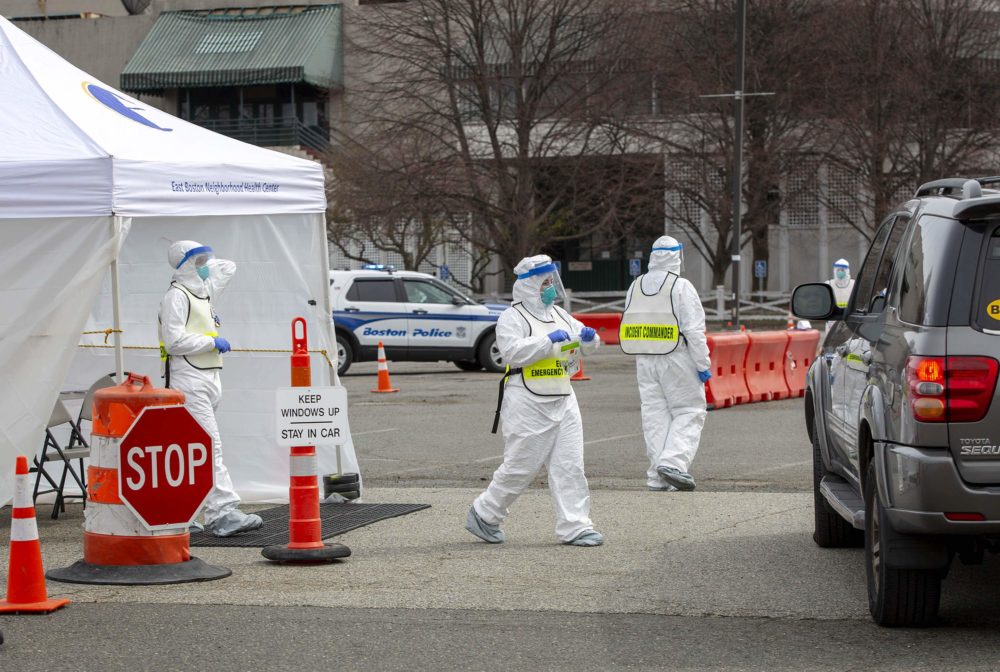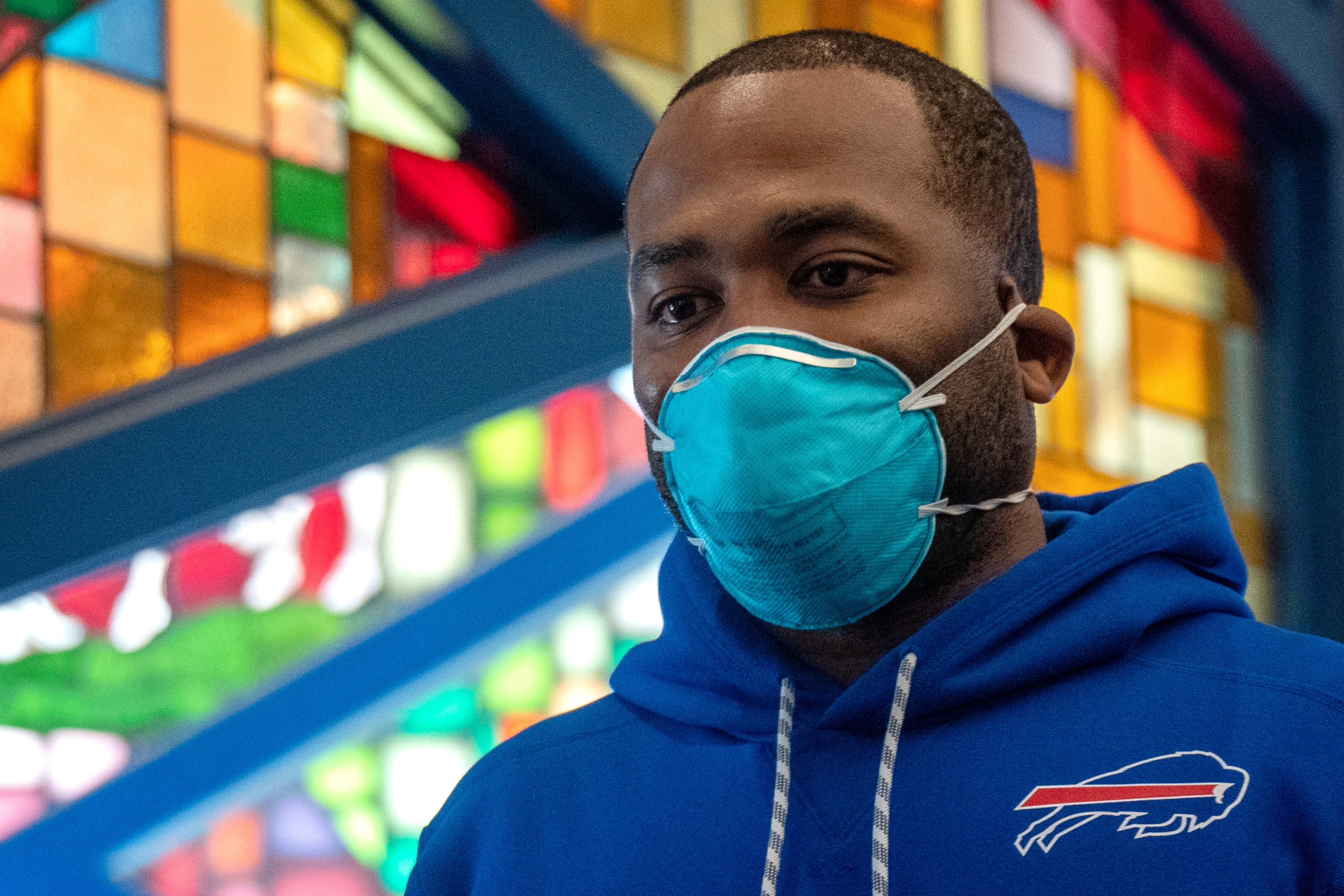Episode 194: The Moral Dilemmas For Frontline Health Care Workers; Coronavirus Deepens Racial Health Disparities
Health care workers are facing moral dilemmas and complicated questions during the pandemic. This week on NEXT, we hear from hospital workers in New Hampshire who feel torn between serving their families and the public. And COVID-19 is not the great equalizer: we’ll talk about the inequities driving racial disparities in infection rates and deaths in Connecticut. Plus, how the sudden quiet outside is affecting birds.
‘Stupid or Brave?’ Health Care Workers Face Moral Dilemmas During Pandemic

Medical staff check in a person at the drive through COVID-19 testing station at Suffolk Downs. (Robin Lubbock/WBUR)
It’s been almost four weeks since states in New England began issuing stay-at-home orders to slow the spread of the coronavirus. Health care workers remain at the center of the response. Patients rely on them, hospitals scramble to buy gear to protect them, and citizens applaud them as heroes in this national crisis. But the experience of working on the front lines during this pandemic can be complicated.
“Are you willing to sacrifice your own health because of a system of a system that failed to prepare?” a registered nurse at a large hospital in New Hampshire told NHPR’s Jason Moon.
Fish Plant Workers Demand Safer Conditions Amid Pandemic
Another group of essential workers are raising alarms about unsafe working conditions during the pandemic. Seafood processing workers across the Southcoast in Massachusetts have spoken out about overcrowding in facilities, as well as a lack of personal protective equipment and disinfectants.
“We are so close to each other that we can hear the person next to us breathing,” Yamileth Alvarado, a worker at Tichon Seafood facility in New Bedford, Mass., said in Spanish to The Public’s Radio. “Sometimes there isn’t even soap to wash our hands.”
This story by Nadine Sebai is available in English and Spanish.
In Connecticut — And Across The U.S. — Black Residents Are More Likely To Die From COVID-19

Pastor Dion Jamar Watkins speaks about the importance of a church reaching beyond its walls as volunteers prepare to hand out free hot meals outside of Mount Olive Church in Hartford, Conn., on April 9, 2020. (Tyler Russell/Connecticut Public/NENC)
Black Americans are disproportionately contracting and dying from COVID-19. It’s no different in Connecticut, where about 12 percent of the state’s population is black, but the rates of infections and deaths are higher when compared to white residents. (And the state data is incomplete. As of this week, only about half of the confirmed cases included information about a patient’s race or ethnicity.)
Tekisha Dwan Everette is executive director of Health Equity Solutions in Hartford, Conn., an organization that promotes equal health care access, delivery and outcomes. Everette told NEXT the virus is shining a bright light on systemic health inequities that existed long before the pandemic.
“It’s important to connect to the fact that historically speaking, we have disinvested — or even, I would dare say, use the word oppressed — people of colors’ opportunity to gain their highest and most optimal health,” Everette said.
As one way to help the community, a trio of churches in Hartford’s North End have teamed up to provide dinner six days a week to anyone in need, Connecticut Public Radio’s Ryan Lindsay reports. The partnership is an example of faith groups working together to meet basic needs in the midst of the coronavirus.
“There are members of my congregation who have battled COVID-19, some of who have even succumbed to it,” said Pastor Jeremy L. Williams of Phillips Metropolitan CME Church on Main Street. “In these times, there’s a tricky balance between making sure we can provide for the needs but making sure that everybody’s staying safe.”
With COVID-19, Fewer Cars, Quieter Soundscape For Birds And Humans

Pixabay
One thing the coronovirus can’t stop is the arrival of spring — early signs like the calls of frogs, or spring peepers. Another is the chorus of songbirds. But this year, even longtime listeners are hearing something different.
“We were stunned at how quiet it was,” said Don Kroodsma, a retired UMass Amherst ornithologist.
The coronavirus shutdown has closed schools and many businesses, so fewer cars are on the road. Even normally busy highways are relatively empty. New England Public Radio’s Nancy Cohen takes a look at what the quieter outdoors means for birds and other animals.
NEXT Wants To Hear From You
President Trump and state governors are starting to talk about when and how to reopen the country. Do you think it’s time? What measures do you want to see in place before that happens? Leave a voicemail on our comment line: 860-275-7595. Or shoot us an email at next@ctpublic.org. We look forward to hearing from you.
Last week, we asked how you’re coping with social distancing. Listener Barbara Wysocki shared this strategy with us:
“Tuesday was a weather-friendly day in Rocky Hill, CT, so I called my 80+ year old neighbor and asked her to go out to lunch. After she laughed, I explained my idea. She would sit on the bench on her front porch with her lunch, while I’d bring my beach chair to sit on her walkway with my egg salad sandwich. … We talked for two hours about our families, our memories of past adventures and hopes for what will come in the future. It was so simple and yet so refreshing.”
Also On This Week’s Show:
- Advocates Fear Domestic Abuse Survivors Are ‘Trapped With Their Abusers’ During Pandemic (WBUR)
- Farming’s COVID Crisis: Specialty Cheese Sales, Milk Prices Plummet (Vermont Public Radio)
- ‘This is gonna be bad’: RI restaurants face tough road ahead (The Public’s Radio)
- The Grounding Ritual of Sourdough (WCAI’s Local Food Report)
- ‘We’re More Together Now’: A Navy Veteran On Life During The Pandemic (Maine Public)
About NEXT
NEXT is produced at Connecticut Public Radio
Host/Producer: Morgan Springer
Executive Editor: Vanessa de la Torre
Senior Director: Catie Talarski
Contributors to this episode: Jason Moon, Nadine Sebai, Shannon Dooling, Susan Sharon, Alex Nunes, John Dillon, Ryan Lindsay, Elspeth Hay and Nancy Cohen.
Guests: Tekisha Dwan Everette
Music: Todd Merrell, “New England” by Goodnight Blue Moon, “Kennebec” by Ben Cosgrove and “The Sea” by Francesca Blanchard.
New to NEXT? You can find every episode or one you missed within our archives.
We want your feedback! Send critiques, suggestions, questions and ideas to next@ctpublic.org. Help us spread the word! If you like what you hear, rate and review us on iTunes.
